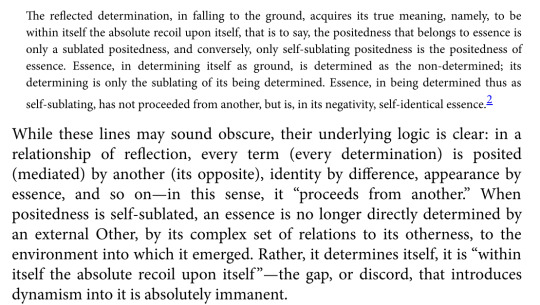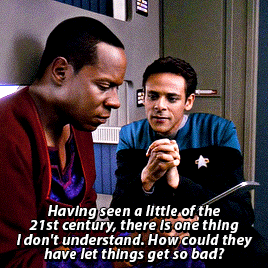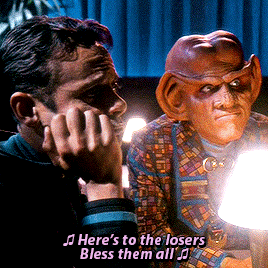#nominalism
Explore tagged Tumblr posts
Text
“The catastrophe of nominalism robs creation of every light of God; night falls.”
Hans Urs von Balthasar, My Work: In Retrospect
3 notes
·
View notes
Text
You think I'm playing at some game? You think iron will keep you safe? Hear my words, manling. Do not mistake me for my mask. You see light dappling on the water and forget the deep, cold dark beneath. Listen. You cannot hurt me. You cannot run or hide. In this I will not be defied.
I swear by all the salt in me: if you run counter to my desire, the remainder of your brief mortal span will be an orchestra of misery.
I swear by stone and oak and elm: I'll make a game of you. I'll follow you unseen and smother any spark of joy you find. You'll never know a woman's touch, a breath of rest, a moment's peace of mind.
And I swear by the night sky and the ever-moving moon: if you lead my master to despair, I will slit you open and splash around like a child in a muddy puddle. I'll string a fiddle with your guts and make you play it while I dance. You are an educated man. You know there are no such things as demons. There is only my kind. You are not wise enough to fear me as I should be feared. You do not know the first note of the music that moves me.
-Patrick Rothfuss, The Wise Man's Fear
#patrick rothfuss#kvothe#kingkiller chronicle#kvothe kingkiller#fae#fata#faen#fantasy#bast#nominalism#magic
37 notes
·
View notes
Text

Absolute Recoil S. Zizek
9 notes
·
View notes
Text
It's ultimately a property of language that true objective translation is impossible. When we talk, we assign labels to a subjective experience. The labels can be shared, but not the experience itself. If I say the word "dog", you don't hear exactly the same thing that I think, because my experience of dogs is particular to me, it's informed by all the particular dogs I have met or seen, which are not the same dogs as you (and even if they were, we would have saw these dogs from different angles and perspectives, each with our own experience).
And that's for something as simple and uncontroversial as "dogs", while speaking notionally the "same" language in the "same" western cultural context. Now imagine different languages. Imagine people separated not just by hundred of miles but by hundreds of years. Imagine entirely different media that use language in completely different ways.
I firmly believe that some stories can never be translated into a different medium and that's okay
66K notes
·
View notes
Link
Is the number 2 a universal truth—or just a symbol we invented? Dive into Platonism, nominalism, formalism, and intuitionism as we explore whether math is discovered or constructed—and why it matters.
0 notes
Text
Realists vs. nominalists - or the old dualism "thinking vs. language"

In the next series, I would like to revisit an old problem that deals with the question: "How much construction does reality contain?". In the following essay, I would like to point out that this question is actually much older than one might think and has its origins in the Middle Ages, but has nevertheless lost none of its topicality. To realize this, you don't even need "VR (virtual reality) glasses" to "look the supposed reality in the eye". A brief look back at the well-known "universality dispute", which I have already tried to shed light on in an older essay "The paradigm shift - or the renovation of the dualistic science building" (https://philosophies.de/index.php/2021/03/31/der-paradigmenwechsel/), is sufficient. In the following, I would therefore like to shed new light on this old topic in order to perhaps make a small contribution to overcoming the supposed dualism of "realists vs. nominalists". I had noticed, not only in the numerous contributions in the comments section on my site (for which I would like to take this opportunity to thank you once again), but also in the contributions on social media, that the discourse was very often about the correct interpretation of the meaning of a term. To begin with, this is not a particularly spectacular observation, let alone insight, as the inadequacy of language usage is well known and not just in the circles of feuilletonists or linguists. Modern philosophy in the form of the epistemologist and philosopher Markus Gabriel had already dealt with this problem in his book "Why the world does not exist" in his critique of an "ontology of meaning". Ludwig Wittgenstein had already summarized this "First Gödel's Incompleteness Theorem" in relation to the connection between language and thought in the often quoted sentence "The limits of my language mean the limits of my world".What is not so often quoted is the interesting introductory sentence to the quotation from Wittgenstein's thesis 5. 6 in the "Logical-Philosophical Treatise": "in order to draw a limit to thinking, we would have to be able to think both sides of this limit (we would have to be able to think what cannot be thought). The boundary can therefore only be drawn in language, and what lies beyond beyond the boundary will simply be nonsense.“
Whether this will all be "nonsense" remains to be seen. After all, the philosophical concept thus established by Wittgenstein is not attributed to Analytical Philosophy of Language and Logical Positivism for nothing. The dualism of "thinking vs. language" or "realists vs. nominalists" that was thus introduced into the world seemed to be insurmountable and continues to have an effect today in the supposed dichotomy of "realism vs. constructivism". I would like to begin this series with a look back at the "Universalism Controversy in the Middle Ages". But instead of looking into my archives, please allow me to refer to the summarized form that I published as an article on the very readable site "Museum of European Philosophy" by Klaus Fürst. So here is the link: https://museum-der-philosophie.de/?p=6415
or: https://philosophies.de/index.php/2024/07/02/realisten-vs-nominalisten/
#constructivism#reality#dualism#realism#thinking#language#philosophy#philosophy of mind#virtual reality#ludwig wittgenstein#kurt gödel#universalism#nominalism
0 notes
Text
Nominalism, AI, and Neurons
Ockham's concept of nominalism is so fascinating because it is at least superficially similar to the way AI understands the world. AI does not "know" about abstract principles, it does not have a way of categorizing the existence of universals except as manifestations of particulars. Universals, which are considered to be independent concepts by humans, are encoded as particular functions in AI. In reality, they are glorified organizational categories. To computers, universals are simply files that certain particulars fall under. If we draw a comparison between the way neural network AI categorizes information and the way people know things, one can claim that nominalism may be the better form of epistemology. Neural networks were developed in the 1950s as simple approximations of how human neurons work, and modern AI is an exponentially scaled and refined version of these simple models. If human neurons abstract universals as specific particulars, then from where comes the human ability to synthesize idea that apply even when training does not apply? Human reason shares many characteristics to nominalism, and could benefit from analyzing the world nominally, but in the end it is nominalist. From the depths of the mind bubbles ideas that are not merely labels for things, but which correspond to reality in am meaningful way.
1 note
·
View note
Text
Aliens - and the Catalog of Human Experience
A few years ago I got tuned in to a podcast that prompted some interesting reflection. While listening to that podcast, I was introduced to "The Gods of Eden", a book about the origins and history of humanity. While the podcasters were reviewing the book, I became interested in the Good vs. Evil motif that was developing. Christ was Good, but the Old Testament God was a bit of a Demiurge, and I was intrigued, having not been given a full workup on the issues surrounding how Christ could be Good, but the Old testament God from which he sprang could be bad.
I texted the Hosts of another podcast to ask if they'd look into it.
Their next episode was a mockery of aliens.
I lost a whole lot of respect for these hosts at that exact moment. Especially since aliens became the topic, and not Good vs. Evil motif that I had been most interested with.
However, to say that "The God's of Eden" didn't include the idea of aliens would be wrong. Everything about the book involved a materialist presupposition of alien interference into human societal evolution. The problem was that my interest revolved around the dichotomy between the Good God and a Bad God; not aliens. In hindsight, Perhaps I was unclear in my inquiry as to my interest.
Nevertheless, since aliens are a subject of interest, and since "Nones" follow supernatural threads of thought, I will give my take - which hasn't really wandered too much throughout my life.
And that is this…
There's a lot of weird stuff that people experience.
I'm not going to say that aliens are real or not. I'm also not going to say that anyone who's seen something they interpret as "alien" is a hallucination.
What I will say is that the world is huge, and wonderful, and full of mystery. Half of what we think we know may be wrong, and the rest may be distorted. Nobody knows how anything works, as all actions are contingent upon preconditions - why does mass work the way it does regarding gravitational pull? Nobody knows. We accept our gravitational constants and constraints and move on, unconcerned that we don't really know why things work the way they do; only that they do, in fact, work the way they do.
So what do we have?
We have a Catalog of Human Experience.
We have Cyclopean Masonry, the Pyramids, Stonehenge and any number of truly impressive structures such as Puma Punku with very precise cuts into hard stone, all dotting the globe. The cool thing about these structures is that people can see them in person, they can touch them. Not bad for a catalog. The problem is that none of these structures give evidence for anything beyond amazing engineering. Engineering that humans could have developed and lost do to other priorities - such as the development of concrete.
The other thing we have is the eyewitness reports of strange lights in the sky - When I was a kid, the Battle of LA was sited, though official sources have pulled back and attribute that event to Imperial Japan. However, That still doesn't account for the Phoenix Lights, the Hessdalen Lights, the Marfa Lights, and historically The Air Battle of Stralsund, the 1561 Celestial Phenomena over Nuremberg. and the 1566 celestial phenomenon over Basel. Every once in awhile, you hear someone earnestly recount an event where they saw something they couldn't explain, and attribute it to aliens.
Much of this is on the internet, if you can wade through the sensationalist garbage. When I was a kid, I read books. There were a few compelling accounts in England where someone observed a landed UFO, and "figures".
The truth of the matter is that "A" doesn't always necessitate "B", or if "A" and "B" appear to be related, that doesn't necessitate "C". The Fundamental Attribution Error, also called correspondence bias, is enough of a thing that Wikipedia has a full article on it.
What we have are mysteries.
Deep, abiding, and profound mysteries.
Some may be related, some may not. But I refuse to accept that every single one is delusional.
And none of these mysteries create a doubt in my mind about God. In fact, the actual fact that these mysteries continue to perplex and confound the wise amongst us, only confirms the mystery of the universe…
And of the God who runs it all.
Lord Jesus Christ, Son of God, Have Mercy upon me, A sinner.
0 notes
Text
The Philosophy of Natural Kinds
The philosophy of natural kinds deals with the classification and categorization of objects, entities, and phenomena in the natural world. It explores the concept of natural kinds as groups or categories that reflect the structure of reality, rather than arbitrary or human-made classifications. This area of philosophy is central to metaphysics, philosophy of science, and philosophy of language.
Key Concepts in the Philosophy of Natural Kinds:
Definition of Natural Kinds:
Natural vs. Artificial Kinds: Natural kinds are categories that exist independently of human thought or social conventions. They are contrasted with artificial or conventional kinds, which are categories created by humans for practical purposes. For example, "water" and "gold" are considered natural kinds, while "furniture" or "vehicles" are seen as artificial kinds.
Essential Properties: Natural kinds are often thought to have essential properties, which are the characteristics that all members of the kind share and that define what it means to belong to that kind. For instance, the chemical structure H₂O is an essential property of water.
Realism about Natural Kinds:
Metaphysical Realism: Realists about natural kinds argue that these kinds exist independently of human beliefs, language, or practices. According to this view, natural kinds reflect the objective divisions in nature, and science discovers these kinds rather than inventing them.
Essentialism: Some realists hold an essentialist view, which suggests that natural kinds have a set of necessary and sufficient conditions (essential properties) that determine their membership. For example, the essence of a species like "tiger" includes certain genetic and biological traits.
Nominalism and Conventionalism:
Nominalism: Nominalists, on the other hand, deny the existence of natural kinds as objective features of the world. They argue that categories are constructed by humans and do not reflect any inherent divisions in nature.
Conventionalism: Conventionalists believe that the categories we use to classify the world are based on human conventions and practices rather than on any intrinsic structure of reality. According to this view, what counts as a natural kind is largely determined by social or linguistic conventions.
Philosophical Issues:
Inductive Inference: Natural kinds are often linked to the problem of induction in philosophy. The idea is that if natural kinds are real, they can support inductive inferences—generalizing from a sample of observations to broader conclusions. For example, observing that all samples of water boil at 100°C (under standard conditions) allows us to infer that this is a property of the natural kind "water."
Scientific Classification: The philosophy of natural kinds has significant implications for scientific classification. Scientists rely on the notion of natural kinds to group entities in ways that reflect underlying natural structures, which is crucial for forming scientific laws and theories. For example, the periodic table in chemistry is a classification of elements based on their natural kinds.
Challenges to the Concept of Natural Kinds:
Biological Species Problem: One of the major challenges to the idea of natural kinds is the problem of biological species. In biology, species are often seen as fluid and not always fitting neatly into natural kinds because of evolution, gene flow, and hybridization. This challenges the idea that species have essential properties or that they are fixed natural kinds.
Homeostatic Property Cluster (HPC) Theory: In response to such challenges, some philosophers propose the HPC theory, which suggests that natural kinds are not defined by a single essence but by a cluster of properties that tend to co-occur due to a stable underlying mechanism. For example, a species might be defined by a cluster of genetic, morphological, and behavioral traits that are maintained by evolutionary processes.
Natural Kinds in Chemistry and Physics:
Chemical Elements: The concept of natural kinds is perhaps most straightforward in chemistry and physics, where elements and fundamental particles are seen as paradigmatic examples of natural kinds. Each element on the periodic table is classified based on its atomic number, which is considered an essential property of that kind.
Subatomic Particles: In physics, particles like electrons, protons, and neutrons are also treated as natural kinds, with specific properties (e.g., charge, mass) that define their identity.
Natural Kinds in the Social Sciences:
Debate on Social Kinds: The application of the concept of natural kinds to the social sciences is more contentious. Some argue that categories like race, gender, or mental disorders should be treated as natural kinds, while others see them as socially constructed and not reflecting natural divisions in the world.
Social Kinds as Natural Kinds: Some philosophers propose that certain social kinds could be considered natural if they are stable and have causal powers similar to those of natural kinds in the physical sciences. For instance, certain mental health conditions might be seen as natural kinds if they consistently manifest specific symptoms and respond to particular treatments.
The philosophy of natural kinds is an exploration of how we categorize and understand the world around us. It raises important questions about the nature of reality, the basis of scientific classification, and the extent to which our concepts reflect objective divisions in the natural world. Whether natural kinds are real or constructed, essential or cluster-based, the debate continues to shape our understanding of science, language, and reality itself.
#philosophy#epistemology#knowledge#learning#education#chatgpt#ontology#metaphysics#Philosophy of Science#Essentialism#Realism#Nominalism#Classification#Scientific Taxonomy#Induction#Biological Species Problem#Homeostatic Property Cluster (HPC) Theory#Natural Kinds in Chemistry#Social Kinds#Philosophy of Language#Naturalism
0 notes
Text










most relatable character ➣ Julian Bashir STAR TREK: DEEP SPACE NINE (1993-1999)
#startrekedit#trekedit#scifiedit#tvedit#ds9edit#star trek#ds9#deep space nine#deep space 9#julian bashir#alexander siddig#userarmchair#*#my gifs#i nominated him most relatable character myself there was no poll sorry
8K notes
·
View notes
Text

CHARACTER ADDED TO PARTY!
5K notes
·
View notes
Text

grammy nominations for record of the year 2025
#now and then was nominated for grammy's this year wohoo#i don't think they have a chance to win record of the year they might win rock performance though#that band broke up in 1970 and they're still being awarded lol#thank you ringo starr for your contribution#they wouldn't have been here if it were not for you#the best beatle#the beatles#paul mccartney#john lennon#george harrison#ringo starr#beatles#memes#now and then#grammys
7K notes
·
View notes
Text

Rowan Williams, Christ the Heart of Creation
1 note
·
View note
Text
more of this shattered glass au!

here’s the high guard! elita, bee & orion together overpower D pretty easily and start frolicking through the city laying waste to everything, so they side with D to help him make a stand against his ex-gang and….they have a big fight or something??? i dont know!! but it’s cool to draw!!





Orion, bee, and elita still ultimately end up killing alpha trion through the power of friendship, but thats a comic for another time!!
#i drew this in one evening brainrot is one hell of a drug#starscream in this universe was probably begging the high guard to stop electing him as leader#but since he was pretty competent at it he just kept getting nominated#bro was BEYOND relieved to be replaced#i have a big ol comic for D and Orion in the works stay tuned!#THANK YOU FOR LOVING THIS AU#megatron#d 16#orion pax#optimus prime#bumblebee#b 127#soundwave#shockwave#starscream#transformers#maccadam#shattered glass#tf one#transformers one#zorangetf
6K notes
·
View notes
Text
Isaiah Berlin summarises Herzen's core ethical and philosophical beliefs:
"...that nature obeys no plan, that history follows no libretto; that no single key, no formula, can, in principle, solve the problems of individuals or societies; that general solutions are not solutions, universal ends are never real ends, that every age has its own texture and its own questions, that short cuts and generalisations are no substitute for experience; that liberty - of actual individuals, in specific times and places - is an absolute value; that a minimum area of free action is a moral necessity for all men, not to be suppressed in the name of abstractions or general principles..."
'Herzen and Bakunin on Individual Liberty', in Russian Thinkers, by Isaiah Berlin
0 notes